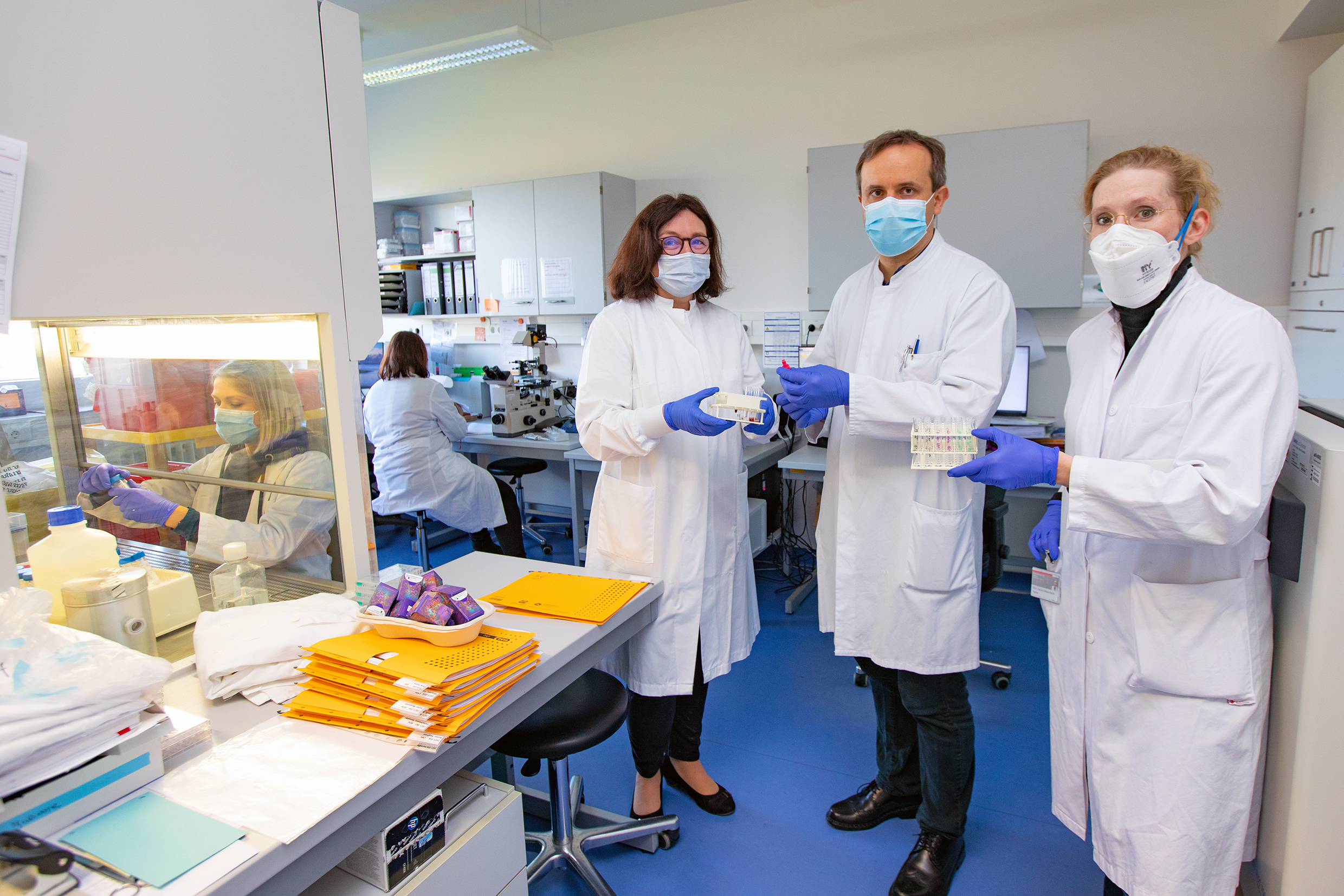MHH: Successful healing trial with immune cells against JC virus

Professor Dr. Britta Eiz-Vesper, Professor Dr. Thomas Skripuletz and PD Dr. Franziska Hopfner with blood samples in the laboratory for T cell routine control of the Institute of Transfusion Medicine and Transplant Engineering. Copyright: "Karin Kaiser / MHH".
18.05.2021
The John Cunningham (JC) virus infects about 70 to 90 percent of all people worldwide without most of them even noticing it. But once it has entered the body, the genetic material of the pathogen remains dormant. If the immune system is weakened or shut down by a serious illness or by immunosuppressive drugs, the virus is reactivated and multiplies. It can migrate into the central nervous system via the blood. There is then a risk of a rare brain infection, which often leads to death within a few weeks. So far, there has been no treatment for this progressive multifocal leukoencephalopathy (PML), which gradually destroys brain tissue. But now an interdisciplinary team at Hannover Medical School (MHH) has found a way to stop the spread of the virus. They treated two PML patients with certain defence cells that were able to push back the JC virus in the body of the affected person. Although the therapy was only used for individual healing trials, the results are so groundbreaking that the journal Neurology: Neuroimmunology & Neuroinflammation has now published them.
Matching T-cells transplanted
Until now, there was only one treatment option for patients who had to take immunosuppressive drugs due to a disease or after a transplant: If these were discontinued, there was a chance that the PML would not develop further and possibly heal. However, stopping immunotherapy is often not possible and can lead to the loss of the donor organ after a transplant, for example. "Now, for the first time, we have an approach to combat the virus directly without major side effects," explains Professor Dr Thomas Skripuletz, senior physician at the MHH Department of Neurology. The solution lies in the blood of healthy people who are infected with the JC virus but do not become ill. They have precisely fitting defence cells from the group of white blood cells. These T cells (T lymphocytes) recognise the attacker as foreign to the body and initiate an immune response. If such specific T lymphocytes are transplanted into the body of PML patients, they fight the JC virus there and the patient's condition stabilises.
MHH T-cell donor register identifies the matching donors
"However, this only works without problems if the donor cells are HLA-compatible, i.e. have the same tissue characteristics as the recipients," explains Professor Dr. Britta Eiz-Vesper, immunologist at the MHH Institute for Transfusion Medicine and Transplant Engineering. As the institute is not only one of Germany's leading manufacturing sites for virus-specific T cells, but also maintains the only T cell donor register, the scientist can quickly locate suitable people for a T cell donation. "We not only register the HLA characteristics of the blood cells of our blood donors, but at the same time determine the number of specific T-cells against different virus types," says the immunologist. In this way, effective and also compatible T cells from donors who are not related to the patients can be used for cell administration.
To do this, the donor blood is stimulated in such a way that the T cells sought are filtered out. Then they can either be administered directly or frozen for later use. "In this case, we were looking for T cells against the BK virus, which is closely related to the JC virus, because it meets the requirements for drug production and these leukocytes can recognise and eliminate both types of virus equally," the scientist explains.
Virus load in the neural fluid decreases
"For our publication, we described the successful treatment of a bilateral lung transplant and another patient with severe inflammatory disease of the immune system with the BK virus-specific T cells," says PD Dr. Franziska Hopfner, senior physician at the Department of Neurology. In both cases, three administrations of anti-JC-active donor T-lymphocytes led to a significant improvement in the respective state of health. "The brain recovered amazingly quickly and the viral load in the neural fluid decreased significantly," explains the neurologist. One year after this treatment, scars are still visible in the affected brain regions, but the patients are largely stable. In the meantime, three more PML patients have been successfully treated at the clinic.
"This means we are well on our way from a non-treatable disease to a successful PML therapy," emphasises Professor Skripuletz. This is all the more important, he says, as the disease is probably too seldom in the focus of treating physicians and therefore possibly occurs much more frequently than assumed. "In any case, there are more and more immunosuppressive treatments for neurological diseases, which favours brain infection by the JC virus," says the neurologist. The MHH team would now like to prove the effectiveness of the therapy in a clinical trial. Then the individual case treatment could become an approved therapy for all PML patients.
The treatment of PML at the MHH was carried out in cooperation with scientists from the Department of Neurology with Clinical Neurophysiology, the Institute of Transfusion Medicine and Transplant Engineering, the Department of Paediatric Haematology and Oncology, the Department of Pneumology and the Institute of Diagnostic and Interventional Neuroradiology.
For further information, please contact Professor Dr Thomas Skripuletz, skripuletz.thomas@mh-hannover.de, telephone (0511) 532-3816.
The original paper "Allogenic BK virus-specific T cell treatment in two patients with progressive multifocal leukoencephalopathy" can be found here.